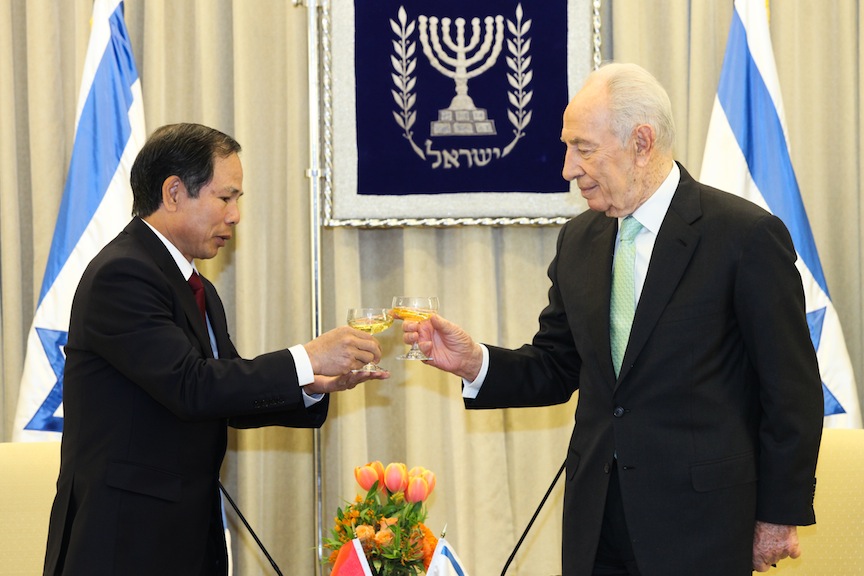IN THE MEDIA
Political opportunities on the Asian economic frontier
January 7, 2014 | Colin Rubenstein

Dr. Colin Rubenstein
Jerusalem Post, 21/12/2013
Israel is fast finding a new economic frontier in Asia – one which offers distinct political and diplomatic benefits, as well as economic ones.
What Israel uniquely represents in terms of economic dynamism, cutting-edge technology, ecological and agricultural know-how, fostering entrepreneurship, expertise in both counter-terrorism and disaster relief, military IT, innovative medical aid and humanitarian assistance is today admired and being sought out by more and more Asian states.
On his recent visit to Australia, Economy Minister Naftali Bennett described Israel as a potential “lighthouse,” because it has strong foundations but also “shines its light for the benefit of others.” Certainly, many Asian nations are starting to see Israel in similar terms. Israel must keep that development moving and also harness growing economic ties to nurture other benefits, especially diplomatic and political.
Bennett recently participated in a conference of the World Trade Organization in Bali, Indonesia. Indonesia does not formally recognize Israel but there are growing informal links between the two states. Many Indonesians are interested in what Israel has to offer in a variety of areas.
Over the past few years, numerous influential and important Indonesians have visited Israel, including media delegations sponsored by the Australia/Israel & Jewish Affairs Council (AIJAC) and the American Jewish Committee, and have regularly met with Israeli leaders such as President Shimon Peres, Justice Minister Tzipi Livni and Defense Minister Moshe Ya’alon, who are all very sensitive to the importance of Asia.
On his return to Israel, Bennett stated he “spoke in front of 157 of the world’s economic ministers” in Bali, and that Israel “advanced trade agreements with surprising countries,” although he declined to say which ones. Furthermore, it has been reported that while in Bali, Israel and Russia agreed to launch formal talks aimed at establishing a free trade zone, while separately, the Chinese and Israeli prime ministers have also agreed to significantly upgrade economic ties. China is currently Israel’s largest trading partner in Asia and the third-largest worldwide; Jerusalem’s annual trade with Beijing is expected to rise to $10 billion over the next five years.
India-Israeli trade volumes have increased from a modest $200 million in 1992 to $6b. in 2012-2013. The two nations have experienced a convergence in areas such as science, medicine, water technology, agriculture, IT, intelligence, military equipment and cooperation in space. In 2008, they signed an agriculture cooperation agreement, pursuant to which there are teams of Israeli agricultural experts in many areas of India helping to vastly increase crop yields, and many centers of excellence have been established.
Israel has extensive trade with other Asian countries – ranging from $2b. with Japan and South Korea to several hundred million dollars with Vietnam. It also has longstanding, growing economic and educational ties with Singapore.
The burgeoning educational ties with Asia were exemplified in 2012 when the Israeli government sponsored an Asian science camp, attracting 250 top students from 22 countries to join 35 Israeli students for a week-long program of lectures by world-class Israeli researchers.
Israel also has a proud record of humanitarian contributions in Asia, which is attracting notice. Most recently, in the wake of the devastation of Typhoon Haiyan in the Philippines, a 148-person Israeli medical team set up a field hospital in Bogo City, one of the worst affected areas, treated over 2,600 people and received rave reviews from virtually everyone who looked at what they were doing. This followed many similar post-disaster efforts, including in Turkey in 2011 and Haiti in 2010.
Meanwhile, Israel is being recognized, and even sought out, as a source of assistance and expertise across the small island states of the Pacific. Israeli aid has included sporting and school equipment and diabetes monitoring kits, medical aid, expertise in science, technology, health, agriculture and water management, in countries including Nauru, Palau, the Marshall Islands, Micronesia, Tuvalu, Kiribati, the Solomon Islands, Samoa, the Cook Islands and Tonga. The Jewish state is even considering recent requests from Fiji for Israeli observers for its upcoming election, and Papua New Guinea for help with maritime surveillance.
While highly skewed voting at the UN is unlikely to change any time soon, many countries in Asia are realizing that Israel is not only a valuable partner and friend, but offers indispensable advice and technologies for major problems directly relevant to them. The highest levels of Israeli government – including Prime Minister Binyamin Netanyahu – are well-aware of this significant development.
Israel should by now recognize that “lighthouse” Israel has a huge amount to offer and is much in demand in Asia and the Pacific. Furthermore, AIJAC’s experience with leaders in Southeast Asia makes it clear that many would be much more sympathetic to Israel’s situation and understanding of the genuine barriers to a two-state outcome, if only exposed more intensively to the Israeli side of the story – something they infrequently hear.
However, the traditional Israeli diplomatic and financial establishment view that the economic benefits Israel achieves in Asia should not be jeopardized by pressuring friendly countries to act more positively in international forums still largely prevails.
The time has come for Israel’s diplomats, politicians, officials and business leaders – working together with knowledgeable Diaspora communities like those in Australia and the US – to upgrade efforts to convince Israel’s new, old and developing friends in Asia that everyone would benefit if they would find ways to express their friendship politically and diplomatically – and not just through trading ties.
The author is executive director of the Australia/Israel & Jewish Affairs Council (AIJAC) in Melbourne, Australia.





